Drug abuse is always a major social problem in China. Many historical, economic and geological reasons make China an important region for the campaign against drugs and illicit drug trafficking. Thus, Chinese drug law and county drug committees form a strong and effective anti-drug system to prevent the "cultivation and production, trafficking and ingestion or injection of narcotic drugs" (Anti-Durg Act of the People's Republic of China Chapter 1 Article 4).
However, the harshness of the Chinese drug campaign is often criticized around the world. As we all know, there is a general legal development where more and more countries have abandoned the death penalty. But China still insists on the death penalty (depending on the situation) if a person is found guilty under drug law.
In this blog I will make an overview of China's history against drugs. I also want to introduce you to the great historical events. They are pushing for reform of drug legislation in addition to a national boycott of drug use. Through these events, the Chinese government has built up a high degree of social awareness of drug abuse.
Overview of Chinese anti-medical scope
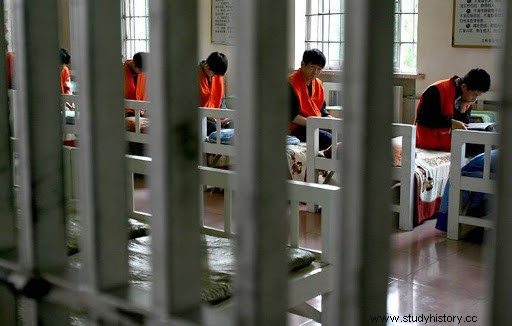
In China, all drugs that can make people addicted are strictly under control. There are two main categories - drugs and psychotropic drugs. Some of them are legal for medical use, such as morphine and pethidine. Most substances on the list are banned for any purpose. No trade, no production, no use. In particular, cannabis and cannabis products are all illegal in China. I know that some countries (eg Canada) have legalized cannabis for medical and / or entertainment purposes. But in China, the consumption of cannabis products can lead to the death penalty.
When we talk about the death penalty, a person responsible for drug trafficking or production does not always get it. There are three types of sentences for those who break the drug law. The most serious is, of course, the death penalty. Defendants can also receive 15 years in prison or life imprisonment, depending on one's circumstances. However, drug trafficking and trafficking in a certain amount will provide sufficient evidence of the death penalty, but not necessarily. For example, 50 grams of cocaine, 100 grams of morphine, 200 kg of caffeine or 150 kg of cannabis products can lead smugglers to the end of their lives.
The anti-drug system is difficult for the police. The police are the only authority that decides whether drug addicts should be sent for mandatory detoxification or drug treatment together for a maximum of 3 years. The police also continue to track down drug users, and they do random drug tests on drug users to make sure they do not go back to the old days.
Criticism against Chinese drug campaign
There has been constant criticism of the Chinese campaign against drugs, because it is "far too inhuman". It is very common to see judges imposing the death penalty when defendants are involved in drug trafficking and smuggling. Drug users must also go to compulsory detoxification, which is similar to prison. Because the police have all the power to decide where these drug users should go. Mandatory detoxification is not part of the public health component.
It is also common to see the Chinese government refuse to release foreign defendants involved in drugs. In 2013, an Australian citizen, Cam Gilespie, carried more than 7.5 kg of methamphetamine, also known as ice, in his luggage. When he arrived at Baiyun Airport, Guangzhou, the Chinese police arrested him. At the time, he was trying to board an international flight. Although the Australian Government expressed concern and tried to negotiate, this Australian smuggler received his death sentence on 13 June 2020.
Similarly, Canadian citizen Robert Schellenberg was sentenced to 15 years in prison in 2018 for drug-related offenses. But in 2019, after reviewing his case, the court found that his sentence was too lenient. On January 14, Schellenberg also received the death penalty, regardless of the claim of Canada's Secretary of State.
This criticism always argues that the execution from China is too cruel, and the Chinese judiciary should abolish the death penalty. Even for foreigners who commit a crime in China, there is no mercy. The Chinese judiciary imposes the death penalty on anyone who breaks the law.
Geological factors
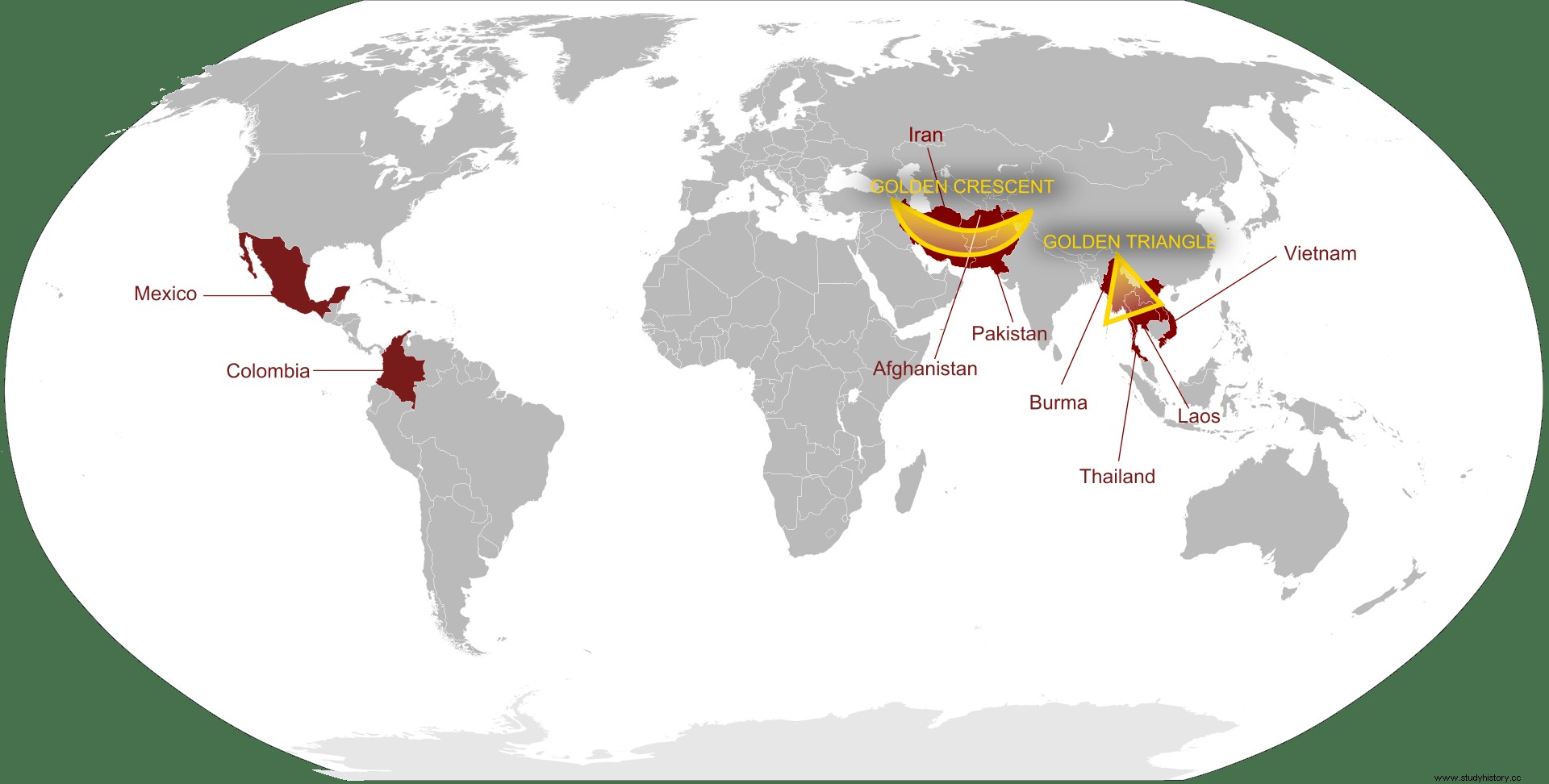
Golden Triangle
The Golden Triangle is where the borders of Thailand, Laos and Myanmar meet at the confluence of the Ruak and Mekong rivers. This area is mountainous; thus, it is a good place for opium cultivation and drug smuggling. The Golden Triangle is one of the largest opium-producing areas since the 1950s. It also produced heroin and was once the largest place where most of the world's heroin was delivered until the beginning of the 21st century.
The golden triangle arose when the CCP took over China. The Chinese government executed dealers mercilessly and sent millions of drug users to forced treatment. They reformed the Anti-Drug Act and banned all types of opium-producing activities. Eventually, illegal opium production had to move from southern China. Somewhere around the Chinese border, an unstable political status suited them best.
Today, the Golden Triangle produces synthetic substances, especially methamphetamine. Drug trafficking and smuggling have become the mainstay of the local population to earn a living. Drugs from the Golden Triangle are exported to Australia, New Zealand and East and Southeast Asia.
Golden Crescent
Golden Crescent is located at the crossroads of Central, South and West Asia. It has a long history of being an illegal drug production and trading area. It is also the largest opium-producing area with a mountainous landscape. Golden Crescent also dominates the cannabis industry due to the high resin yield.
Afghanistan plays an important role in the Golden Crescent. It now produces over 90% of the world's opium without pharmaceutical grade. It is also the largest producer of heroin, the second of the Golden Triangle. The market size is 64% larger than the golden triangle. Despite worldwide efforts to capture and seize as much opium product as possible, only 1% of total heroin production in Afghanistan is destroyed.
Anti-Drug Historical Events
The First Opium War
The first opium war took place in 1839-1842 between Britain and the Qing Dynasty in China. At the time, the British government was not happy with the large trade deficit with China. They were already planning to invade Qing China and took it as another colony. They sold opium to China, about 1,400 tons per year, as opium was a medicinal ingredient in China. The British government requested more trading ports, but the Chinese Qing government rejected them. They then went on to ask for legalization of narcotics within the Chinese administration, but the government repeatedly rejected this proposal. In 1838, the Chinese Qing government began actively executing drug traffickers. These actions brought tension between the two countries.
Background
The Daoguang emperor appointed Lin Zexu to investigate why the British government wanted to run opium sales in China. The Qing government soon found out that the British government banned the sale of opium in Britain, but the British government wanted to legalize opium sales in China. Queen Victoria claimed it was moral to do so; However, the intention was doubtful that the British government did not legalize opium on its own lands.
In early July 1839, two British soldiers were intoxicated in a trading port. They were outraged and killed an innocent villager. The Qing government would like to file a lawsuit under Chinese law, but Superintendent Eillot refused to hand over the two soldiers. Under constant political and economic tension, the rumor soon spread to Britain. But the story turned out differently:Chinese soldiers killed an innocent British man. Soon, as the British Navy tried to buy supplies from local villagers, local officers stopped them from shopping. The local officer wrote a letter to the Qing government. His letter claimed that they won the battle and greatly underestimated the power of the Royal Navy.
Wars
With ignorance and excessive trust, the Qing government lost every battle when the British navy attacked trading ports. The Chinese navy had to withdraw to the interior. The Royal Navy then moved its expeditionary force to Hong Kong.
The first opium war ended with the first unjust and humiliating peace treaty - the Nanking Treaty. The treaty contained three main parts:
- Open foreign trade. Open five more trading ports. Abolish Canton System. Abolish tariff.
- Paying 6 million slivers is equivalent to the opium destroyed by Lin Zexu. Hong Kong would be a crown colony of Britain.
The first opium war began to make Qing China a semi-colonial and semi-feudal society. The year 1839 is the beginning of Chinese modern history. The evil effect of the opium habit on the Chinese people, and the arrogant way in which the British asserted their superior power to guarantee profitable trade, have since been the founders of Chinese historiography.
Drug campaign:Destruction of opium on Humen
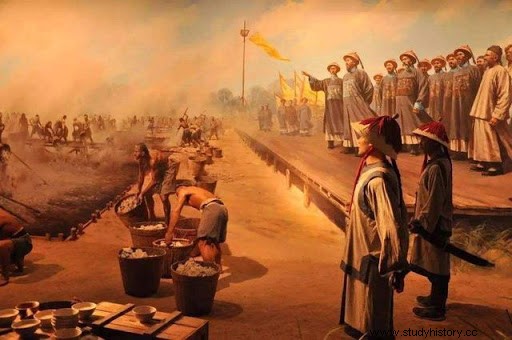
By early 1729, the Qing government had already issued a ban on opium sales. However, the opium trade was very profitable. They could not eliminate opium completely, as some corruption officers sheltered an illegal opium market.
In 1838, Lin Zexu investigated opium sales in Britain. Qing government released legislation banning opium sales. Lin Zexu forced unions to hand over the names of all the merchants involved in the opium trade. He arrested over 1,600 drug users and drug smugglers. He also temporarily shut down the Canton System, which served as a custom.
Lin Zexu ordered workers to dig some large pools by the sea. They filled the pools with seawater and dumped all the opium inside. Instead of burning opium, Lin Zexu used limestone and seawater to destroy opium. It took over 40 days for the last piece of opium to disappear.
The Second Opium War
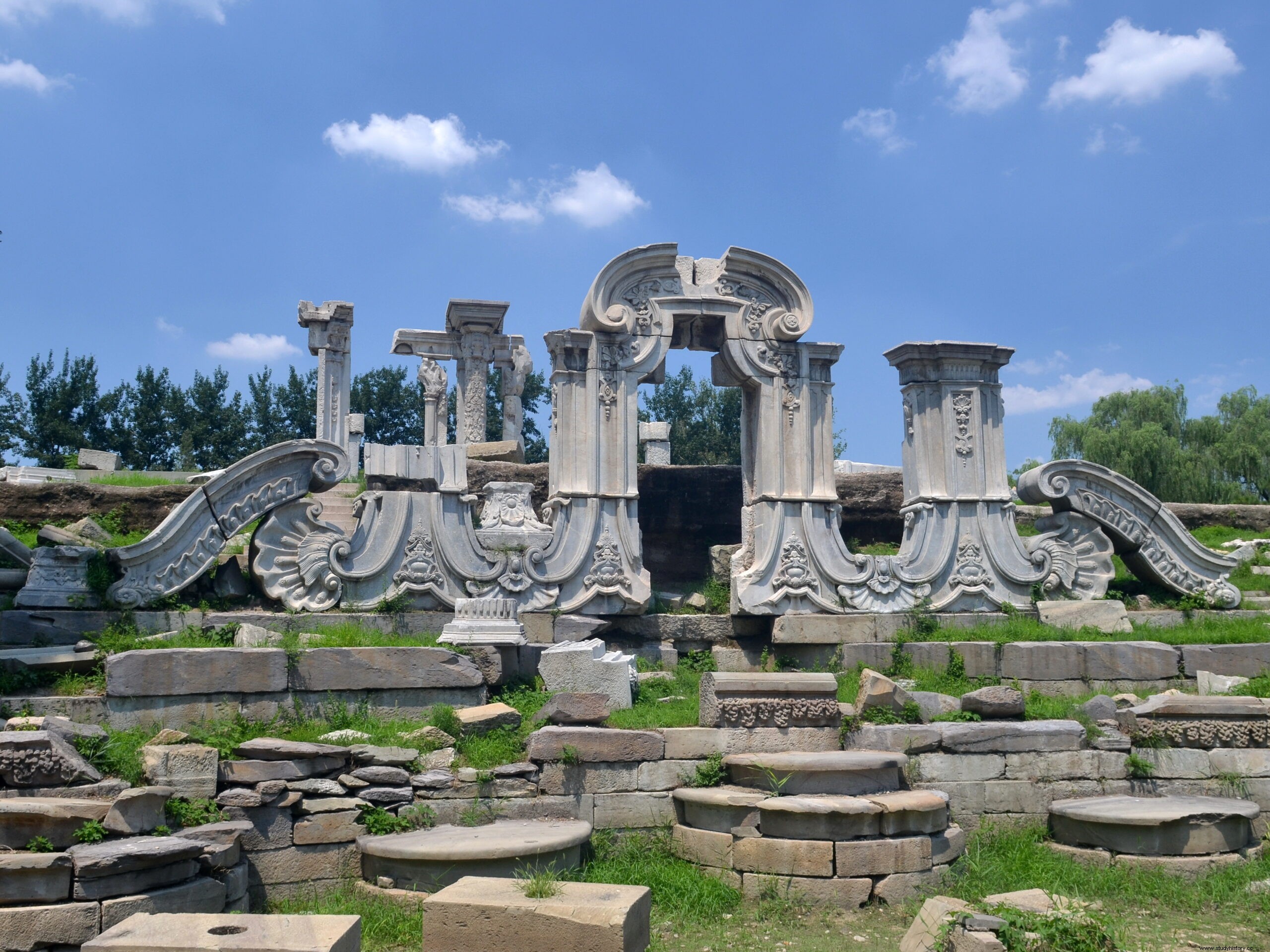
The Second Opium War (1856-1860) was an expanded version of the First Opium War. The French Empire and the British Empire led the war and forced Qing China to open more trading ports. Western empires saw how the British government achieved its "success", so they wanted to join the war and share. The intention was to force China to fully open up to foreign traders and to legalize the opium trade. The United States and Russia sent envoys to Hong Kong to provide British and French military aid, but in the end Russia did not send any military aid.
The war ended with another loss of Qing China. The British and French armies seized Beijing, burned down the summer palaces, robbed hundreds and thousands of remnants of Qing China. The Qing government had to sign other treaties, which were the Tianjing Treaties and the Aigun Treaty. These Treaties are required:
- Britain, France, Russia and the United States would have the right to establish diplomatic legions (small embassies) in Beijing (then a closed city).
- Ten more Chinese ports will be opened for foreign trade, including Niuzhuang, Tamsui, Hankou and Nanjing.
- The right of all foreign vessels, including commercial vessels, to navigate freely on the Yangtze River
- The right of foreigners to travel in the interior regions of China, which had previously been banned
- China would pay compensation of four million taels of silver to Britain and two million to France.
And of course legalization of the opium trade again.
Result
The two wars have permanently traumatized the Chinese until now. The influence was disturbing. Today, the Chinese government (China) has not fully recovered all the national taxes plundered by the British Empire. The opium wars also provided a channel for all kinds of drugs to enter the Chinese market. Although the war stopped when the Qing government signed these treaties, the spread of drugs was rapid.
The Mekong River Massacre 2011
On October 5, two Chinese cargo ships sailed through a stretch of the Mekong River in the Golden Triangle region on the borders of Myanmar (Burma) and Thailand. It was supposed to be a quiet morning. However, the region has long been plagued by lawlessness and is notorious for drug trafficking.
The two ships were attacked by armed forces. All 13 crew members on the ship were killed and dumped in the river. It was the deadliest attack on Chinese nationals abroad in modern times. The Chinese government was shocked and furious. They temporarily halted shipping on the Mekong River and called on Thailand, Myanmar and Laos to investigate the matter jointly. It turned out that 9 Thais involved in drug smuggling attacked the two ships.
Drug Campaign:Arrest Sai Naw Kham

With further investigation, the Chinese government noticed a gang of drugs led by Naw Kham, a former supporter of Khun Sha (the former drug lord of the Golden Triangle). After Khun Sha surrendered to Myanmar's military force, Naw Kham took over his dirty business and became the next infamous drug lord in the Golden Triangle. The Laos government arrested him and extradited him to China on May 10, 2012.
Naw Kham and the three other members of the drug gang were convicted of killing the 13 Chinese sailors. In December 2012, the Yunnan Supreme Court rejected all of Naw Kham's appeals, upholding the death penalty previously imposed. On March 1, the four men were executed in China
Anti-drug movie based on the Mekong River massacre
Operation Mekong is a film based on the Mekong River massacre. It was released in 2016. The main characters are Eddie Peng and Zhang Hanyu. The film is now available on US Nextflix.
China's response to drugs
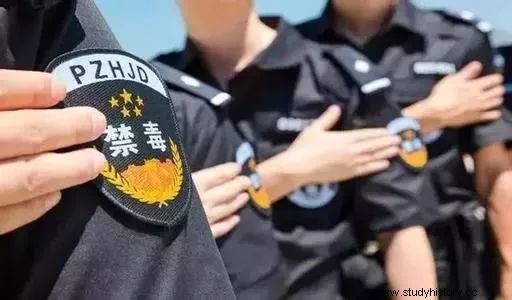
The history of Chinese fighting drugs is long. There are historical reasons why the campaign against drugs in China is so strict. During the opium wars, there was once a humiliating nickname for weak Asian countries - "Sick man in Asia". The name also referred to drug addicts. People who smoked opium at the time were all thin and unhealthy. The century of humiliation in Chinese history began in 1839, when Drugs played an important role, and it is essential to ensure that this never happens again.
As I mentioned earlier, both the Golden Triangle and the Golden Crescent are geologically close to China. The landscape in both areas is also difficult for regular police searches. China is responsible for maintaining order around the border. With the rapid economic development, more and more illegal drug trafficking is targeting China as a potential market. As China remains a developing country, legislation and the judicial system are not yet complete.
At this stage, the police-centered anti-drug system is the best solution. The average life expectancy of a police officer against drugs is only 41 years. Their identity information is top secret. It's very dangerous to be a drug cop in China. More than 300 police officers die every year for the campaign against drugs. It's a touching story:A son died as a drug policeman 36 years old in 2020. The father was a drug policeman who died of a drug smuggling grenade 26 years ago, in 1994. The son bore his father's badge with the same identity Number. They served the same purpose as eliminating drugs in China.
In China, celebrity addicts will be banned forever, as they are shameful and disrespectful to police officers against drugs. For example, Ko Chen-tung, a Taiwanese actress, and Jaycee Chan, the son of Jackie Chan. They were involved in drug abuse in 2014, and had never had a second chance to return to the entertainment industry.
the conclusion
Chinese drug history is made of war and blood. These experiences are permanent stamps in the memory of the Chinese people. For Chinese people, the best way to help the drug campaign is the "Protect your life, stay away from medication" slogan in the Chinese drug campaign. I agree with the slogan. As ordinary people, all we need to do, and as little as we can, is stay away from drugs. The higher the awareness, the lower the drug trade.
